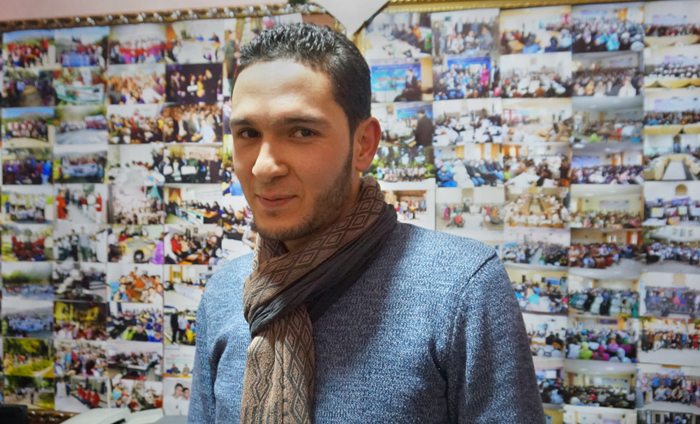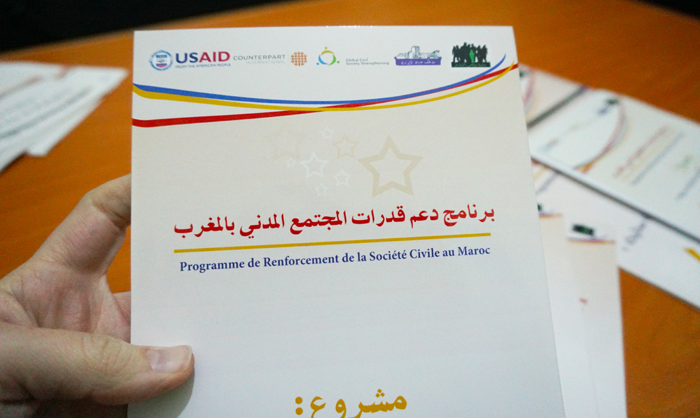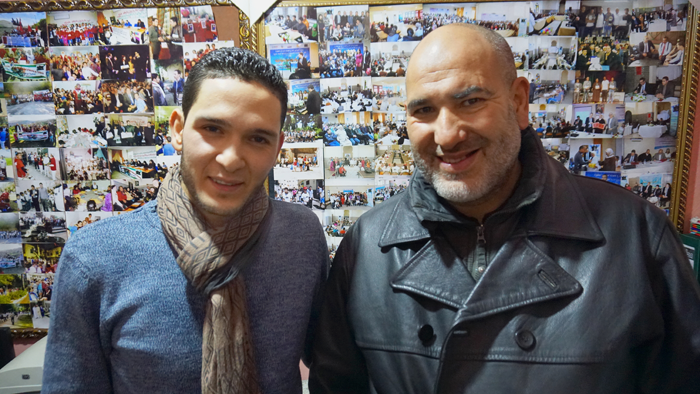After turning down a maze of nondescript beige-colored alleys, the colorful murals on Citoyens des Rues’ walls shone like a beacon. Children played ball outside, and Ali Lagsab, President of the Citoyens des Rues Association, rushed out with a smile to greet us.

Ali Lagsab is the founder and president of Citoyens des Rues (“Street Citizens”), which advocates for women, children, and people with disabilities in his neighborhood in Fez, Morocco.
Ali grew up in the district of Jnan El Ward, an impoverished neighborhood in the city of Fez, often referred to as the cultural capital of Morocco. Growing up in a family that valued education, Ali was struck by how many children he saw dropping out of school. Once he graduated from high school, Ali wanted to try and help combat the growing illiteracy rates in Jnan El Ward and knew from his own experience that his parents were instrumental in supporting his education. With that, an idea was born: work with local mothers to teach them to read, at the same time encouraging them to value education for their own children. Ali founded Citoyens des Rues – “Street Citizens” and less than 10 years later, they have a facility with classrooms, 38 volunteer teachers, and are tutoring more than 380 mothers from the community.
Communication Between Government and Civil Society
Perhaps more importantly, Ali has decided to be a voice for all of the marginalized populations within his community, working with women and children, people with disabilities, and the civil society organizations (CSOs) that represent them to continue improving Jnan El Ward. Since the new Constitution was passed in 2011 ensuring improved partnership between the government and the people in Morocco, Ali has come to realize that this progress isn’t possible without an open channel of communication with the local Commune, or government body.
“I grew up among civil society associations and I always dreamed of creating my own association in order to strengthen the dialogue between the youth of my neighborhood and the elected actors of my district,” remembers Ali. With support from Counterpart International, Ali has turned his dream into reality.
Roadmap to Partnership
In May 2016, Counterpart awarded Citoyens des Rues with a grant to launch the “Building Local Participatory Democracy” project. The project was designed to promote dialogue between the local government and citizens in Jnan El Ward, making sure that Commune priorities reflected the needs and concerns Ali was hearing from his friends and neighbors. His organization drafted a charter, formalizing the relationship between civil society and government to establish a roadmap for true partnership within the community. Citoyens des Rues hosted a series of consultative meetings, produced joint recommendations, and then used funding from Counterpart to hire legal experts to finalize the charter, co-signed by 30 different local organizations.

Citoyens des Rues drafted the charter with input from members of local government and other CSOs in the community.
The charter is the first of its kind in Morocco, transforming the traditional relationship between government and civil society into one of open communication, dialogue, and mutual respect. Through the signing of the charter, the Commune has agreed to:
- organize community forums to hear and respond to local priorities
- include CSOs in the development of a gender-sensitive communal budget to ensure that marginalized people receive the programming and funding they need
- establish local youth and neighborhood councils to give a voice to more than 200,000 youth in Jnan El Ward
- ensure that issues like education and job creation are top priorities for the Commune, and that clear and transparent criteria for granting public funds and electing government representatives are followed.
Mr. Aziz Fernin, Vice-President of the District of Jnan El Ward, worked closely with Counterpart and Ali to ensure that the charter had buy-in from local government representatives and would make a real difference in the community. Mr. Fernin told us that the Citoyens des Rues charter will make the Commune and the community stronger by ensuring the local government is fighting for the issues that truly matter to the people. Ali couldn’t agree more, saying “We are all stronger when we work together.”

Ali Lagsab (left) and Aziz Fernin (right)
Both Ali and local government officials are excited about what has improved in the community and citizens are grateful that their voices are being heard. Now, Citoyens des Rues and Counterpart are exploring ways to share their story more broadly so that communities throughout Morocco can use the charter as a model for stronger partnerships between government officials and citizens.
What’s next for Ali? He smiles and shyly tells me that he is currently juggling his work at Citoyens des Rues with law school. He’s going to graduate soon and hopes to someday be appointed by the King as a Wali, or leader in his region. So, I ask, will he need to give up Citoyens des Rues to make those dreams come true? “She’s like my daughter,” he tells me, gesturing around at the two classrooms full of women learning to read, and the lobby full of children sitting on the floor quietly reading books. “I could never give up Citoyens des Rues. There are so many more people to help!”





